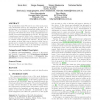Free Online Productivity Tools
i2Speak
i2Symbol
i2OCR
iTex2Img
iWeb2Print
iWeb2Shot
i2Type
iPdf2Split
iPdf2Merge
i2Bopomofo
i2Arabic
i2Style
i2Image
i2PDF
iLatex2Rtf
Sci2ools
ATAL
2015
Springer
2015
Springer
Manipulating the Probabilistic Serial Rule
The probabilistic serial (PS) rule is one of the most prominent randomized rules for the assignment problem. It is well-known for its desirable fairness and welfare properties. However, PS is not immune to manipulative behaviour by the agents. We initiate the study of the computational complexity of an agent manipulating the PS rule. We show that computing an expected utility better response is NP-hard. On the other hand, we present a polynomial-time algorithm to compute a lexicographic best response. For the case of two agents, we show that even an expected utility best response can be computed in polynomial time. Our result for the case of two agents relies on an interesting connection with sequential allocation of discrete objects. Categories and Subject Descriptors F.2 [Theory of Computation]: Analysis of Algorithms and Problem Complexity; I.2.11 [Distributed Artificial Intelligence]: Multiagent Systems; J.4 [Computer Applications]: Social and Behavioral Sciences - Economics Gene...
Related Content
| Added | 16 Apr 2016 |
| Updated | 16 Apr 2016 |
| Type | Journal |
| Year | 2015 |
| Where | ATAL |
| Authors | Haris Aziz, Serge Gaspers, Simon Mackenzie, Nicholas Mattei, Nina Narodytska, Toby Walsh |
Comments (0)

